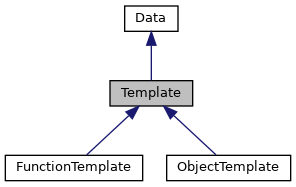 |
v8
8.4.371 (node 14.15.5)
V8 is Google's open source JavaScript engine
|
 |
v8
8.4.371 (node 14.15.5)
V8 is Google's open source JavaScript engine
|
#include <v8.h>


Friends | |
| class | ObjectTemplate |
| class | FunctionTemplate |
Definition at line 11288 of file v8.h.
References v8::kInternalized, String::NewFromUtf8(), Template::Set(), and MaybeLocal< T >::ToLocalChecked().
Adds a property to each instance created by this template.
The property must be defined either as a primitive value, or a template.
Referenced by Template::Set().
| void SetAccessorProperty | ( | Local< Name > | name, |
| Local< FunctionTemplate > | getter = Local< FunctionTemplate >(), |
||
| Local< FunctionTemplate > | setter = Local< FunctionTemplate >(), |
||
| PropertyAttribute | attribute = None, |
||
| AccessControl | settings = DEFAULT |
||
| ) |
| void SetIntrinsicDataProperty | ( | Local< Name > | name, |
| Intrinsic | intrinsic, | ||
| PropertyAttribute | attribute = None |
||
| ) |
During template instantiation, sets the value with the intrinsic property from the correct context.
| void SetLazyDataProperty | ( | Local< Name > | name, |
| AccessorNameGetterCallback | getter, | ||
| Local< Value > | data = Local< Value >(), |
||
| PropertyAttribute | attribute = None, |
||
| SideEffectType | getter_side_effect_type = SideEffectType::kHasSideEffect, |
||
| SideEffectType | setter_side_effect_type = SideEffectType::kHasSideEffect |
||
| ) |
Like SetNativeDataProperty, but V8 will replace the native data property with a real data property on first access.
| void SetNativeDataProperty | ( | Local< Name > | name, |
| AccessorNameGetterCallback | getter, | ||
| AccessorNameSetterCallback | setter = nullptr, |
||
| Local< Value > | data = Local< Value >(), |
||
| PropertyAttribute | attribute = None, |
||
| Local< AccessorSignature > | signature = Local< AccessorSignature >(), |
||
| AccessControl | settings = DEFAULT, |
||
| SideEffectType | getter_side_effect_type = SideEffectType::kHasSideEffect, |
||
| SideEffectType | setter_side_effect_type = SideEffectType::kHasSideEffect |
||
| ) |
| void SetNativeDataProperty | ( | Local< String > | name, |
| AccessorGetterCallback | getter, | ||
| AccessorSetterCallback | setter = nullptr, |
||
| Local< Value > | data = Local< Value >(), |
||
| PropertyAttribute | attribute = None, |
||
| Local< AccessorSignature > | signature = Local< AccessorSignature >(), |
||
| AccessControl | settings = DEFAULT, |
||
| SideEffectType | getter_side_effect_type = SideEffectType::kHasSideEffect, |
||
| SideEffectType | setter_side_effect_type = SideEffectType::kHasSideEffect |
||
| ) |
Whenever the property with the given name is accessed on objects created from this Template the getter and setter callbacks are called instead of getting and setting the property directly on the JavaScript object.
| name | The name of the property for which an accessor is added. |
| getter | The callback to invoke when getting the property. |
| setter | The callback to invoke when setting the property. |
| data | A piece of data that will be passed to the getter and setter callbacks whenever they are invoked. |
| settings | Access control settings for the accessor. This is a bit field consisting of one of more of DEFAULT = 0, ALL_CAN_READ = 1, or ALL_CAN_WRITE = 2. The default is to not allow cross-context access. ALL_CAN_READ means that all cross-context reads are allowed. ALL_CAN_WRITE means that all cross-context writes are allowed. The combination ALL_CAN_READ | ALL_CAN_WRITE can be used to allow all cross-context access. |
| attribute | The attributes of the property for which an accessor is added. |
| signature | The signature describes valid receivers for the accessor and is used to perform implicit instance checks against them. If the receiver is incompatible (i.e. is not an instance of the constructor as defined by FunctionTemplate::HasInstance()), an implicit TypeError is thrown and no callback is invoked. |
|
friend |
|
friend |